Prefer to listen to this guide?
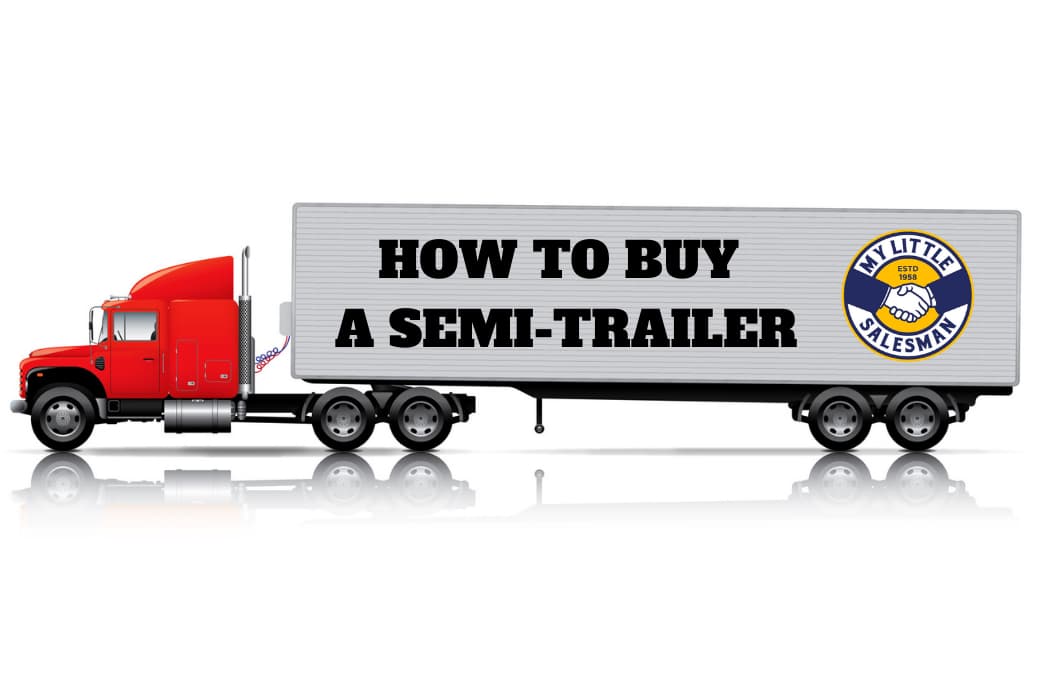
Answering Your New and Used Semi Trailer Buying Questions
Buying a new or used semi trailer doesn’t have to be a headache. In this guide, we’re going to answer all your semi-trailer buying questions related to your need, trailer styles, budget, financing, sellers, and much more.
Guide Contents
Let’s start with the basics!
The term “semi trailer” (or “semi-trailer”) in North America typically refers to a commercial trailer with no front axle—instead, having its front weight supported by its towing vehicle, usually, a truck known as a semi-tractor trailer truck, semi tractor, or simply semi-truck.
A semi-trailer is only partially able to support itself on its axles—hence the name “semi.” The front of a semi-trailer has no axle and must be either supported by its coupled semi-tractor to move or supported by extendable front legs. A full trailer, however, has a front axle and is connected to a vehicle with a drawbar. There are many different properties and use advantages to both semi trailers and full trailers.
Ok, now that we have some of the essential lingo covered, let’s hop into why you’re here—to become an informed semi trailer buyer.
To simplify your semi trailer buying experience, there are a handful of questions that, when answered, will help you narrow your search, helping you find the right semi trailer to fit your needs and budget. Let’s get started!
Before you can start kicking the tires on trailer models, you should begin your search knowing precisely what you need this trailer to do. There are a wide variety of semi trailers for sale, so nailing down your need will save you time and money.
There are nearly as many types of semi trailers as there are items you need to haul. Knowing precisely what you need to haul can help you figure out what kind of trailer you need. The following are a few helpful questions to ask yourself to narrow your search criteria.
- What material type and size freight or equipment are you needing to haul?
- Do you need to haul oversized or incredibly heavy equipment?
- Will you need to be able to dump your trailer loads, and how?
- Will you need to haul liquids, dry goods, aggregate, or building materials?
After you have thoroughly considered what you need your semi trailer to do, it is time to look into what kind of commercial trailer will best suit your needs. Let’s look at a high-level view of what kinds of semi trailers exist.
For the sake of brevity, this will be an overview of semi trailer types. To further determine the perfect version of any of these for you, you’ll want to drill down even further into the various options and add-ons available within these categories.
Dry Van Enclosed Trailers
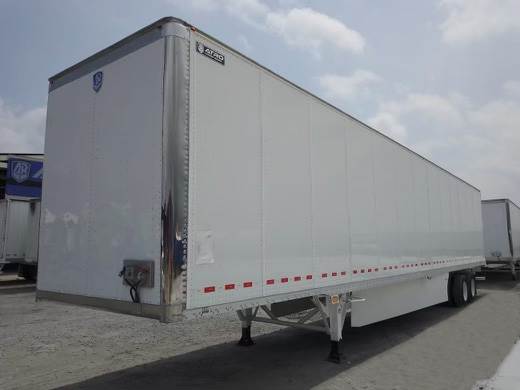
When most think of a semi trailer, dry van enclosed semi-trailers are what come to mind. Dry van semi-trailers are fully enclosed trailers designed to shield loads from adverse weather and theft. Dry van trailers are immensely versatile—capable of carrying everything from parcels to building materials and grocery items. The sheer versatility of these trailers makes them hands-down the most popular choice for trucking companies—comprising two-thirds of all trailers.
Reefer Trailers
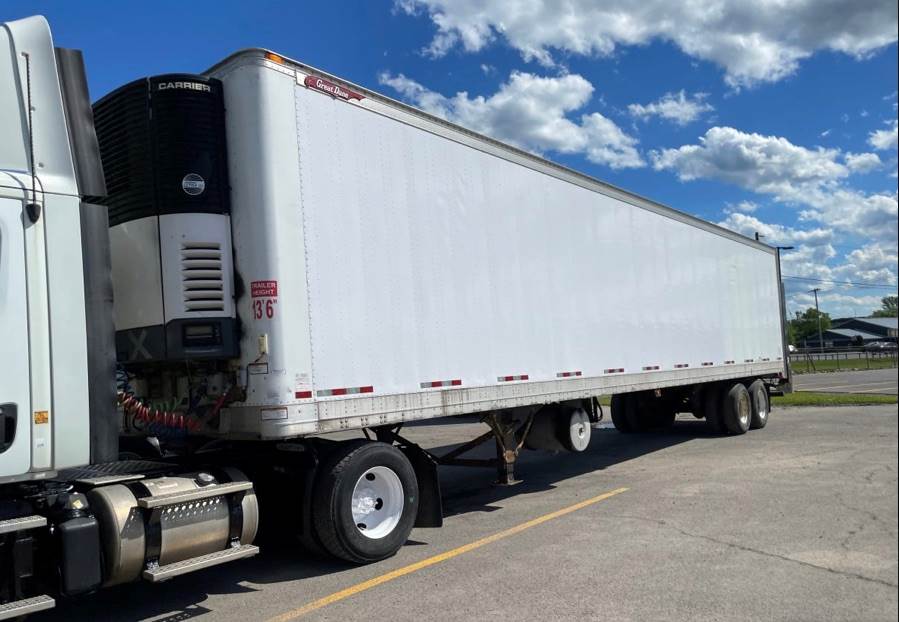
Also known as “refrigerated trailers,” reefer semi-trailers have ample insulation as well as temperature control units—making them ideal for transporting perishable items in need of refrigeration or to remain frozen. In addition to keeping items protected from warmer weather, reefer trailers can also shield temperature-sensitive items from severely cold outside temperatures.
Flatbed Trailers
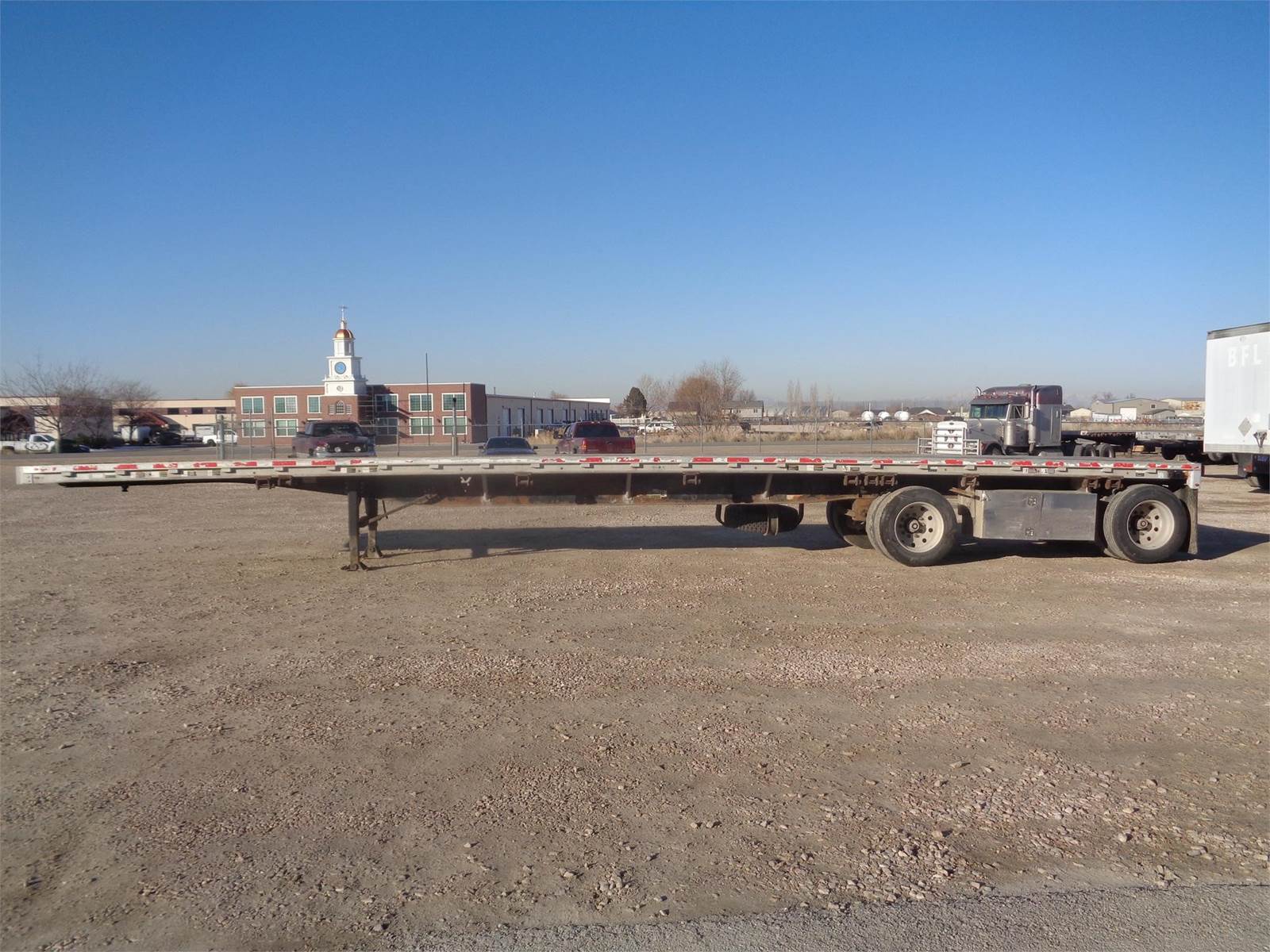
Among the most popular forms of commercial semi trailers are flatbed trailers. As their name denotes, flatbed trailers offer a flat, open deck without a roof or sides. While this design leaves cargo exposed to the elements, flatbed trailers are among the most versatile semi trailers—allowing for oversized freight as well as loading and unloading from any side via forklift or crane.
Lowboy Trailers
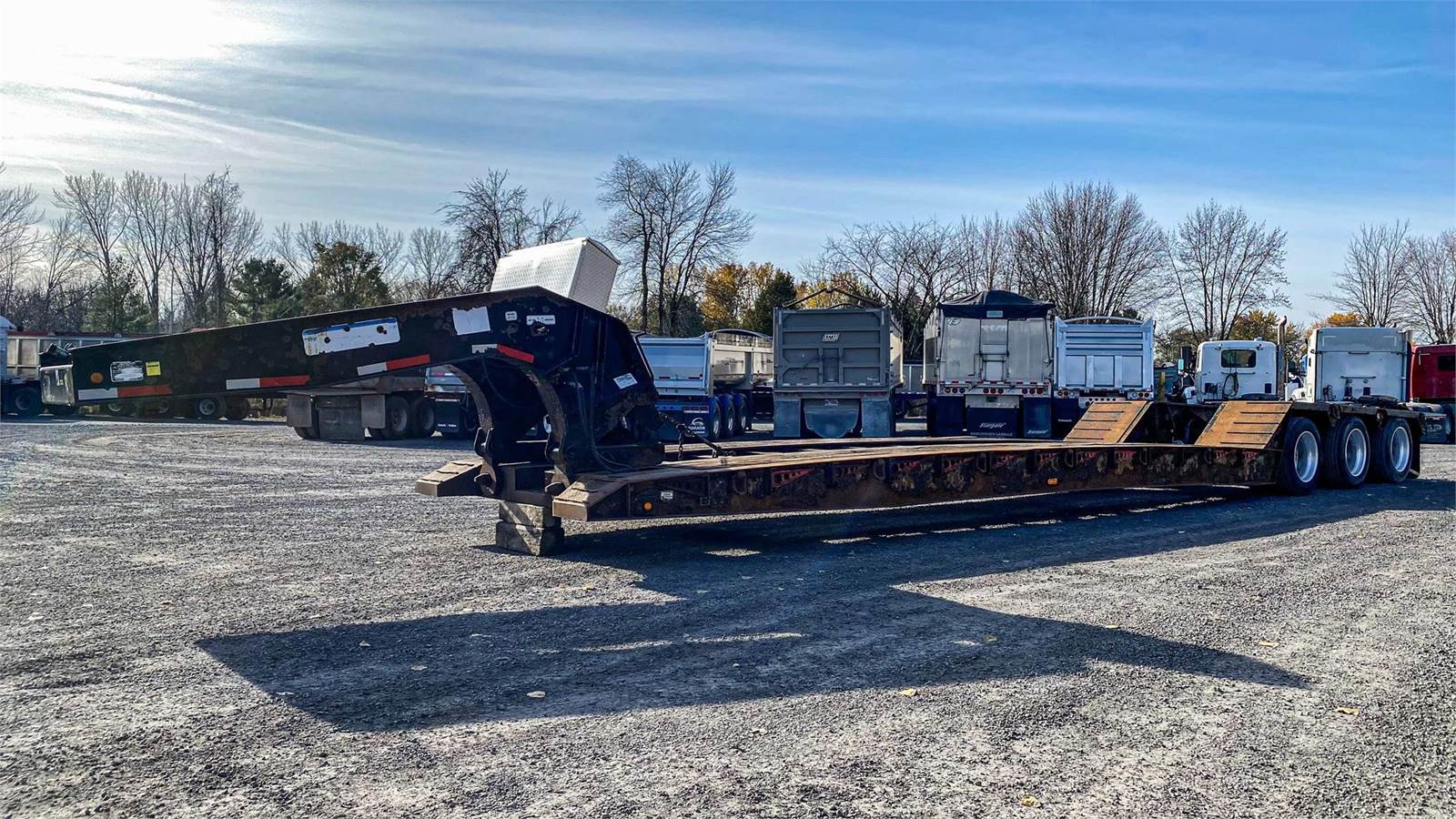
Also known as “double drop trailers,” a lowboy trailer is a form of open-air trailer that offers an extremely low center deck between a front gooseneck and the rear wheels. The lowered center deck has a few different advantages. A lowboy trailer’s lowered deck allows for the safe transport of taller loads on roadways without special precautions or permits. This low deck also provides a lower center of gravity—making the hauling of heavier equipment much safer.
Tank Trailers
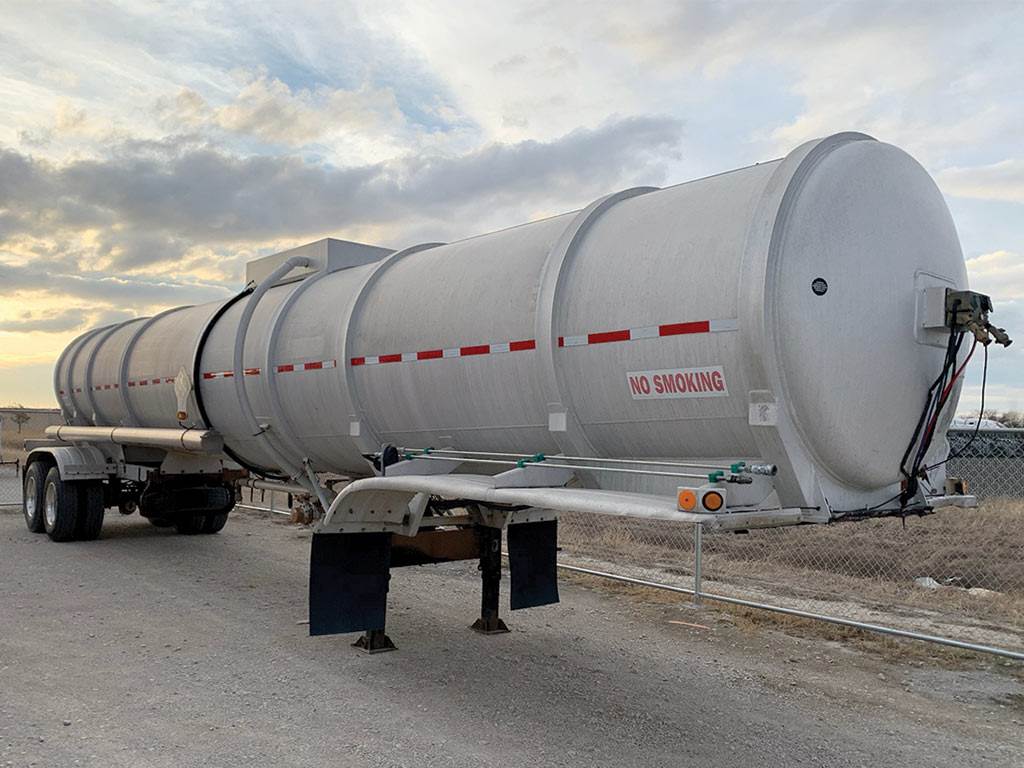
Tank trailers are the preferred choice when you need to move bulk qualities of gases or liquids by road. Tank trailers, sometimes called “tanker trailers,” are the cylindrical trailers you may see outside of refineries or filling up gas stations all over the country. Tank semi trailers can be used to carry anything from beverages and gases to liquids, chemicals, or even bulk dry goods—from sand, grain, cement, or even plastic pellets for manufacturing. Tank semi-trailers come in a variety of sizes and configurations.
Dump Semi Trailers
When you’re hauling materials you need to offload in a timely fashion, dump trailers are usually the tools for the job. Acting in much the same way as dump trucks but at a lower price and with greater versatility, dump trailers are trailers designed to haul materials from one location to another as well as dump said material in a specific place. Let’s look at the most common dump trailer varieties.
Side Dump Trailers
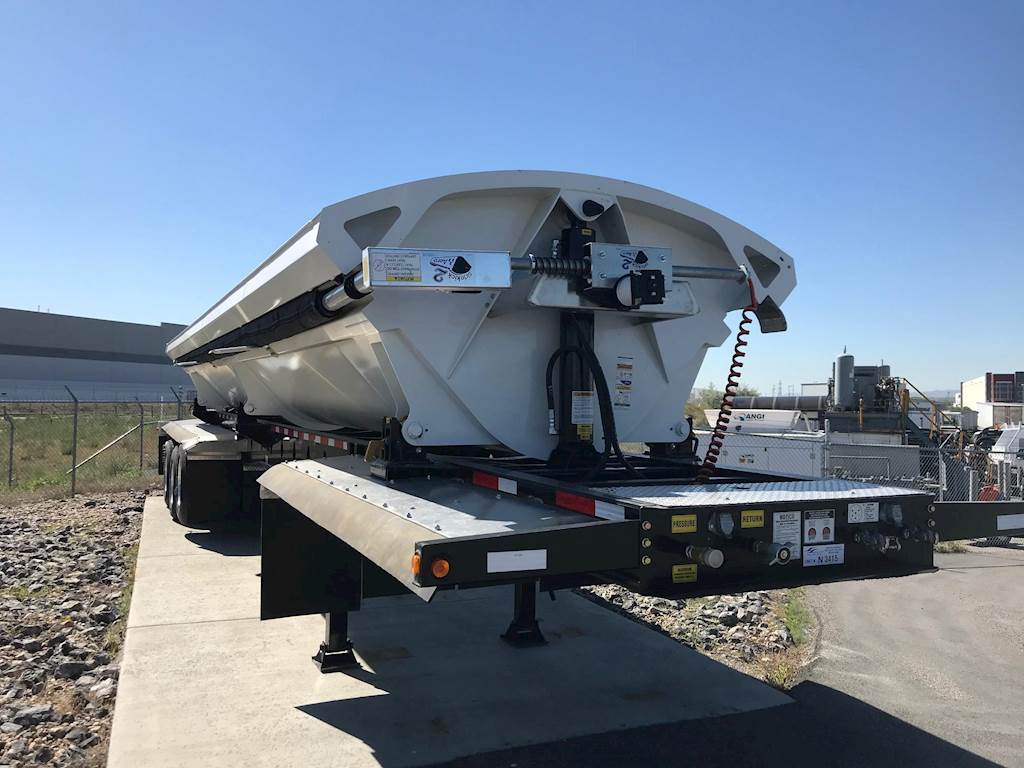
Somewhat of a new kid on the block, side dump trailers allow for a safer dumping to the side of the vehicle using a hydraulic lifting system that tilts and dumps the contents of the trailer off to one side. This design allows for a more stable and speedy offloading of trailer contents.
End Dump Trailers
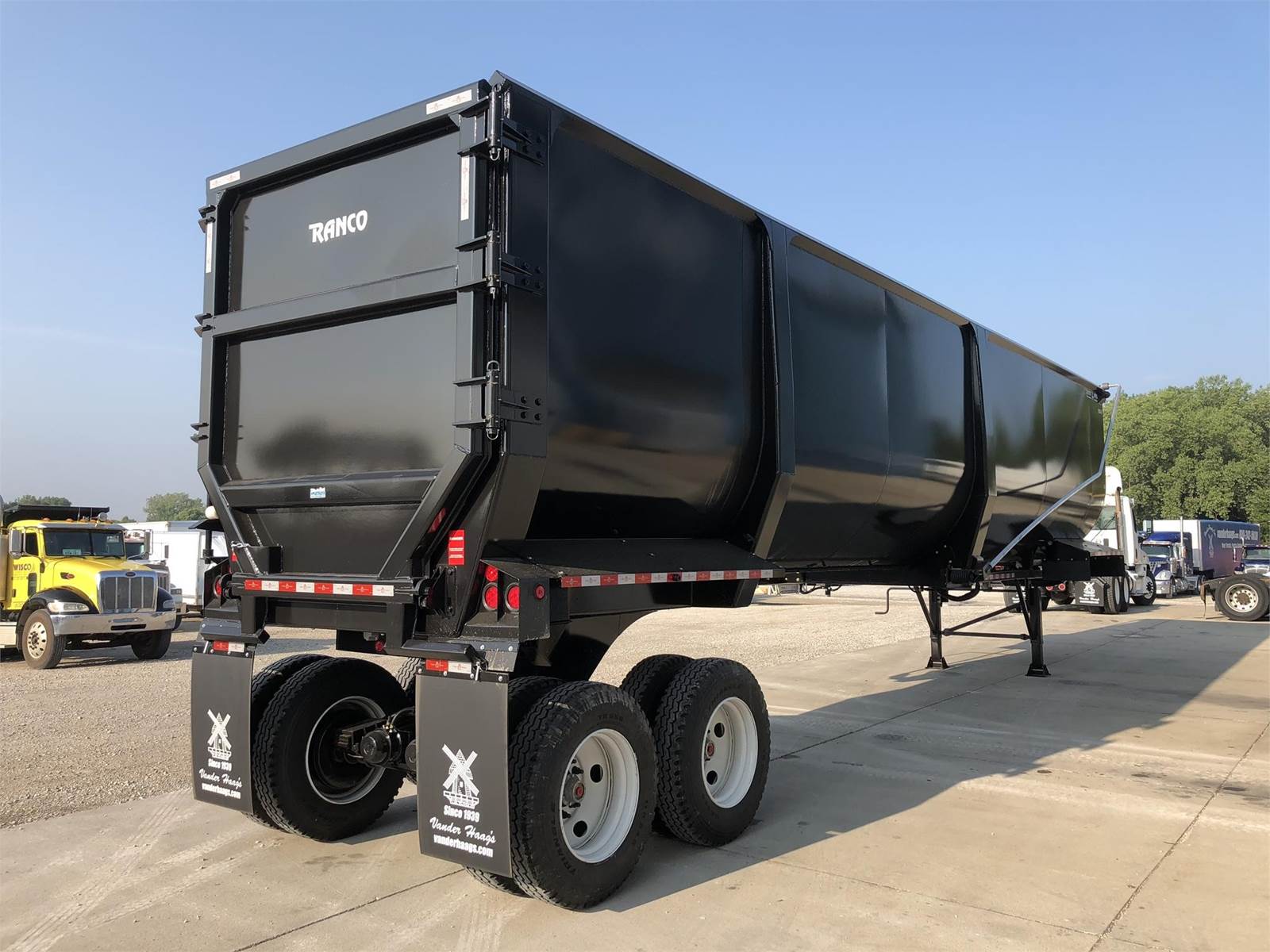
Closely resembling their dump truck cousins, end dump trailers are equipped with hydraulic lifts that allow for a raised front end, allowing gravity to offload materials out of a rear dump gate. While effective, the sheer physics of end dump trailers make them one of the lesser stable dump trailer designs.
Bottom Dump Trailers
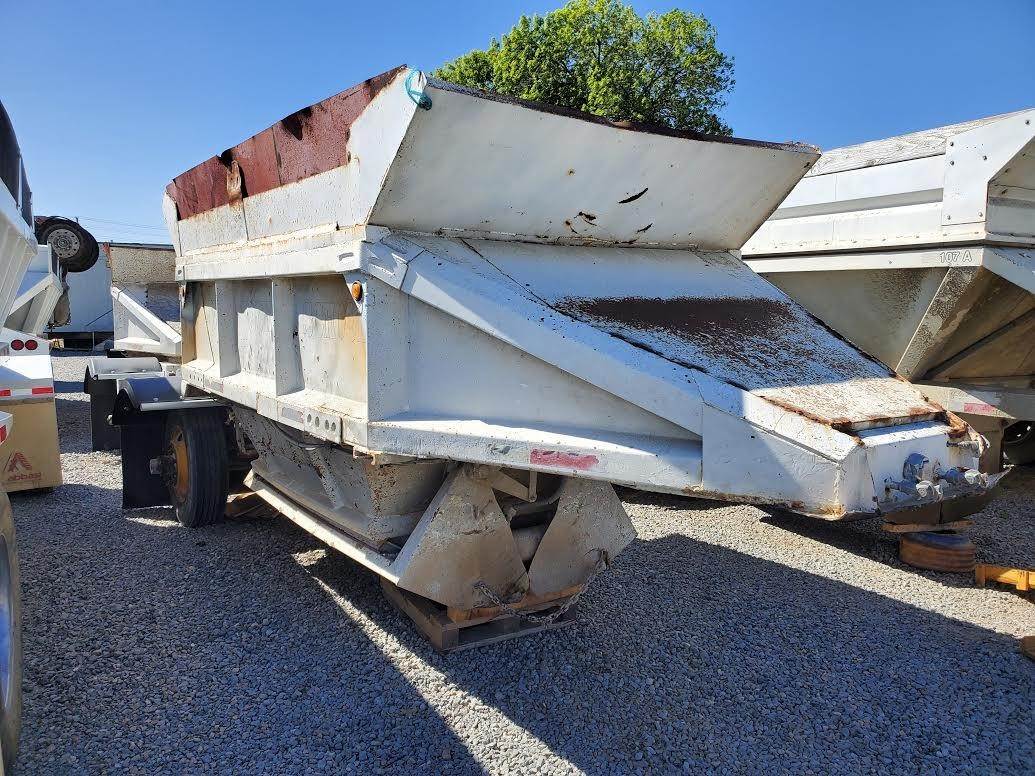
Also known as “belly dump trailers,” bottom dump trailers can release their contents through a dump gate in the trailer floor. This material is usually released over a long line so it can be “windrowed” by agricultural equipment. Due to the “clamshell” floor-positioned dump gate, these trailers are unsuitable for carrying liquid contents.
These are only the main styles of commercial trailers. There are dozens of commercial trailer styles for you to choose from based on your specific need.
To choose the right semi trailer for you or your fleet’s needs, consider the various conditions of the geographic region in which you plan to operate. Research what weather conditions, road types (rough or steep terrain to city highways and streets), or maneuverability challenges your trailer may encounter. Also, different regions may have different legal requirements for commercial trailers operating on their highways and city streets.
When shopping for anything, understanding what you can afford before you start shopping can help ensure you’re not letting others determine how much you’ll spend. Crunch the numbers to determine how much you’re willing to spend on a new or used semi trailer for sale. Once you have your trailer price nailed down, work backward to make sure you’re not wasting time looking outside of your equipment budget.
Are you open to buying a used semi trailer?
While there’s nothing like that new semi trailer smell (is that a thing?), buying a used semi trailer is a good way to save some serious money. And unlike used semi tractor trucks, there are much fewer mechanical parts to worry about maintaining—but that doesn’t mean there aren’t any. Let’s examine what to examine when looking to buy a used semi-trailer.
What to Check When Shopping for Used Semi Trailers
Triple Check the Trailer’s Compatibility with Your Trucks
Even if the condition, price, and components fit the bill, that doesn’t mean a used semi trailer for sale will work properly with your trucks. Before investing much of any time looking into a particular used semi trailer or specific model, triple check the trailer’s compatibility with your fleet of trucks. If coupling modifications need to be made, keep the necessary logistics and price to do so in mind.
Check the Odometer / Hubometer (If Present)
“Do semi trailers have odometers?”
Some semi trailers have odometers, but not all. Trailer odometers, sometimes called “hubometers” or “hubos”, are mechanisms located in one of the wheel hubs of a trailer that counts the revolutions of the wheel. The meter device itself typically remains pointing downward while the wheel spins around it. Trailer odometers are most commonly used by trailer rental companies to track the mileage of their trailers and assess tire usage.
“What is considered high mileage for a semi trailer?”
There are few standards for what is considered a high mileage or low mileage semi trailer. Due to their simple mechanical function (less stuff to break), the overall condition of a semi trailer depends on the state of its components and performance. Most trucking companies will choose to replace their semi trailers once the necessary repairs exceed the performance value of the trailer.
Inspect the Structural Components
A used semi-trailer should be able to support your loads for many years. However, rust, cracks, and questionable repairs can reduce your trailer’s service life. This may require crawling under a semi-trailer with a flashlight, examining dealer photography, or hiring an experienced professional to perform an inspection—something we’ll discuss shortly in this guide.
Run All of the Documentation Checks You Can
What the semi trailer may be hiding could be revealed by running background, market, and accident reports. Get the full scoop on the history of any used semi trailer you’re considering buying. Ask the seller for all ownership transfers, maintenance, and repair documentation.
Check Out the Brakes
Trailer brakes are crucial for the safe stopping of the truck as a whole, making a full inspection of drums, linings, and the ABS very important. Make sure the brakes are free of abnormal wear or damage. Ask to see maintenance documentation for the trailer’s brakes.
Check Out the Tires
Though tires will eventually need to be replaced anyway, their existing condition can reveal issues with the axles, wheels, brakes, or suspension. Look for uneven wear, tread levels, sidewall damage, or bulging. Wear or damage outside of the realm of proper driving should be thoroughly investigated.
Inspect Electrical Components
Check all of the electrical components for a used semi trailer for sale—including all lights and safety precaution equipment.
Additional Costs Associated With Buying and Using a Semi Trailer
So, you’ve calculated how much you can afford to pay per semi trailer. Congrats! Now, did you also factor in the cost of operating said trailer? Between registration, insurance, and maintenance, there are a variety of costs to keep in mind. Outside of the cost of the semi trailer itself, however, a leading expense is the cost of financing.
“What are the main sources of semi trailer financing?”
Unless you plan to pay cash for a semi trailer, you will need to finance the purchase. Fortunately, you have several options.
Dealer or Seller Financing
If you’re purchasing semi trailers from an established dealer, there’s a good chance they have their own financing options—some of which may offer extremely competitive interest rates designed to incentivize buying from them.
Specialized Financing Companies
There are several different commercial equipment financing companies to help out. Some of these can provide highly competitive rates due to their specialized understanding of the industry.
Traditional Banks
Most banks offer business loans that you can use to purchase semi trailers. Keep in mind that they may not be able to offer the most competitive rates due to their limited industry specialization or understanding. In many instances, it’s simply not their wheelhouse. Traditional banks are also notorious for nickel-and-diming some business loans with various rates. Still, some banks may have special programs that may surprise you.
Credit Unions
Because credit unions are not-for-profit organizations, they can be a great source for highly competitive business loans with minimal fees—if any.
So, which of these semi trailer financing options should you look into?
All of them! Obtain detailed semi trailer financing quotes from each of these loan providers. Don’t be afraid to ask questions—especially regarding the “necessity” of various fees, some of which may be quite flimsy under scrutiny. Ask what you can do to achieve a lower rate.
Maximize Your Down Payment
Remember that the best way to reduce the amount of interest you end up paying and lowering your month payment is by maximizing your down payment. The more you can pay upfront, the less you’ll need to finance.
In many instances, insurance coverage extends to a semi trailer from the semi tractor truck’s commercial auto policy. Other times, a semi trailer can carry its own commercial auto policy.
Various forms of insurance coverage can apply to a semi trailer through a commercial auto policy. A comprehensive plan essentially covers all damage—collision or otherwise. Collision coverage covers damage resulting from a collision with another vehicle or property. These options can greatly increase the cost of a policy and are not usually legally required. What is required is liability coverage—financial protection for the owner against an instance in which the trailer causes damage or injury to others. This coverage also covers legal defense fees in the event of a lawsuit.
For the most accurate insurance advice related to obtaining proper and adequate insurance coverage for your semi trailers, consult a trusted commercial auto insurance professional.
Registering your semi trailer with the required entities largely depends on the laws in the state in which your business operates.
How much does registration cost for commercial semi trailers?
The cost of registration for commercial trailers depends on the state of registration and a variety of rating factors—ranging from the gross weight to unladen weight and some flat fees. For a full breakdown of semi truck registration costs, access your state’s Department of Transportation website.
Whether you’re a one-person owner/operator or you’re purchasing semi trailers for a fleet of trucks, it is helpful to know just how many trailers you’ll need before you start your search. If you’re needing multiple semi trailers, buying in bulk from a reputable dealership can reduce the logistical load on your shoulders.
If you’re new to heavy-duty equipment purchasing, you may be wondering, “how do you buy a semi-trailer?” Well, when it comes to buying new or used semi trailers, you’ve never had more source options than you do now. Still, each option comes with its pros and cons.
Buying Semi Trailers from Your Local Dealership
Do you prefer to keep your dollars close to home? Maybe you prefer being able to easily drive over to inspect semi trailers in person? Either way, there is a definite benefit to buying equipment from a dealership or local seller for those who value a “belly-to-belly” business model.
What are the downsides of buying semi trailers from a local dealership?
Keep in mind that these dealerships may have a limited selection of new and used trailers for sale and their prices may not be as competitive as many other sources.
Buying Semi Trailers from Paper or Online Listings
Are your local semi trailer buying options limited? Do you have specific brand or model preferences that the local lot can’t procure? Maybe you’re not thrilled with the local dealer’s prices. Well, paper listings catalogs or online heavy equipment listing services are likely to have several versions of whatever semi trailer you’re looking to buy—and priced competitively to earn your business.
What are the downsides of buying semi trailers from paper or online listings?
Well, unless you plan on traveling to their location, you usually can’t inspect the trailers yourself before they arrive.
However, there are a few ways to get a better understanding of the equipment before you buy it.
Carefully Review Listing Images
Most online semi trailer sales professionals worth their salt will thoroughly document and photograph the heavy equipment items for sale on their lots. If you’re not as sure of what conditions are acceptable versus red flags, you may want to have an experienced professional review the images for a second opinion.
Having Online-Listed Equipment Professionally Inspected
If you’re considering purchasing a new or used semi trailer for sale online without the ability to inspect it in person, you may consider hiring an independent certified professional to inspect the trailer or trailers in question. A Google search can deliver several unbiased semi trailer repair professionals near the seller’s area who have done so in the past. Be prepared to shell out up to a few hundred dollars for such an inspection if that is the route you choose.
Buying Semi Trailers from Private Sellers
If you can find a used semi-trailer listing from a private seller either through the classifieds or through an online marketplace (Facebook Marketplace, Craigslist, etc.), it could be a way to get an incredibly good equipment price. Many private sellers are simply looking to offload equipment they’re replacing, so they’re likely very open to price negotiations.
What is the downside of buying a semi-trailer from a private seller?
If it seems like some private seller prices on used semi-truck trailers are unbelievable, it’s because they are. While you could walk away with an incredible value, procuring the proper documentation can be tricky for private seller transactions. You may also run into difficulty acquiring financing for such equipment, meaning you may need to be prepared to pay cash for a private-sold semi-trailer. And when it comes to private-sold equipment, make sure it is thoroughly inspected by an experienced service professional or you may just be buying someone else’s problems.
Go Forth and Find Your Perfect Semi Trailer
If you’ve made it this far, you’re ready to determine precisely what kind of semi trailer or trailers you need, how to find them, how to pay for them, and how to inspect them for potential issues.
Shop for New or Used Semi Trailers for Sale With Confidence
Buying new or used semi trailers just got easier thanks to your friends at My Little Salesman. Whether you prefer to do business with a local dealership or want to see listings with dealers all over North America and beyond, My Little Salesman has you covered. Feel free to filter your semi trailer search results to only show equipment that meets your specified criteria—making finding your perfect semi trailer a snap.
Shop for a wide range of commercial trailers for sale today.